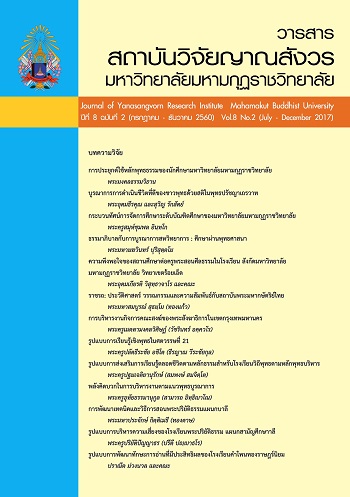CAUSAL MODEL STUDY, FACTOR AFFECTING AND MEDIALTIONAL EFFECT TO ACHIEVEMENT GOALS THROUGH ACADEMIC ACHIEVEMENT OF HIGH SCHOOL STUDENT IN THE SECONDARY EDUCATIONAL SERVICE AREA OFFICE 2
Main Article Content
Abstract
This research intends to develop a casual model of factors, the factor affecting the mediational effect to achievement goals through academic achievement among fourth to sixth year students in Kunnateerutharamwithayakhom School, Matthayom wat thatthong School and Prakanongpittayalai School. The participants in this study consisted of three hundred and fifteen individuals. The tools used in this research can be separated into four categories as follows. Each category corresponds to the rating scales questionnaire about achievement goals, academic self-efficacy, subjective academic values, parent goals, and relationship support through α – coefficient of .90, .92, .87, and .89, respectively. The data were analyzed using path analysis with the use of programs for social science research. The results revealed that the research model fit with the empirical data with Chi-square ( ) of 1.37 at the degrees of freedom equal to 1. Level of probability equal to .24, goodness of fit index (GFI) of 1.00, and standardized root mean square residual (SRMR) of 0.01 . The analysis of the total effect of the variables in the model has shown that the results of the influence that can explain achievement goals are academic self-efficacy, parent goals and subjective academic value with the effect size as .32, .25 and .17, respectively. The result of the influence that can explain academic achievement are parent goals, subjective academic value, achievement goals and academic self-efficacy with the effect size as .36, .31, .26 and -.10, respectively.
Article Details
References
นนทน์ ฤทธิเลิศ. (2555). อิทธิผลของเป้าหมายใฝ่สัมฤทธิ์และตัวแปรส่งผ่านที่มีต่อกระบวนการเรียนรู้เชิงลึก และผลสัมฤทธิ์ทางการเรียนของนักเรียนมัธยมศึกษาตอนปลาย: การวิเคราะห์โมเดลเชิงสาเหตุคู่แข่ง. วิทยานิพนธ์มหาบัณฑิต. ภาควิชาวิจัยและจิตวิทยาการศึกษา คณะครุศาสตร์ จุฬาลงกรณ์มหาวิทยาลัย.
ทิพอาภา กลิ่นคำหอม. (2556). โมเดลเชิงสาเหตุของความยึดมั่นผูกพันของนักเรียนและผลสัมฤทธิ์ทางการเรียนที่เกิดจากอิทธิพลของครู. วิทยานิพนธ์มหาบัณฑิต. ภาควิชาวิจัยและจิตวิทยาการศึกษา คณะครุศาสตร์ จุฬาลงกรณ์มหาวิทยาลัย.
ลักขณา สริวัฒน์. จิตวิทยาสำหรับครู. กรุงเทพฯ: โอ.เอส. พริ้นติ้ง เฮ้าส์.2557
ศรีเรือน แก้วกังลาล.(2549). จิตวิทยาพัฒนาการชีวิตทุกช่วงวัย.พิมพ์ครั้งที่ 9. กรุงเทพฯ: โรงพิมพ์มหาวิทยาลัยธรรมศาสตร์.
สันติ กีระนันทน์. (2556). คุณภาพของระบบการศึกษาไทยที่ตกต่ำ. สืบค้นเมื่อ 20 กุมภาพันธ์ 2558, จาก http://www.tris.co.th/news-insights/articles/109-articles-3.html
สมโภชน์ เอี่ยมสุภาษิต. (2556). ทฤษฎีและเทคนิคการปรับพฤติกรรม. พิมพ์ครั้งที่ 8. กรุงเทพฯ: โรงพิมพ์แห่งจุฬาลงกรมหาวิทยาลัย.
สุรางค์ โค้วตระกูล. (2554). จิตวิทยาการศึกษา. พิมพ์ครั้งที่ 10. กรุงเทพฯ: สำนักพิมพ์แห่งจุฬาลงกรณ์มหาวิทยาลัย.
Al-Harthy,S.,&Aldhafri,S. (2014). The Relationship among Task-Value, Self-Efficacy and Academic Achievement in Omani Students at Sultan QaboosUniversity. International Review of Social Sciences and Humanitie. 7: 15-22.
Cury,F.,Elliot, A. J.,Da Fonseca, D., & Moller., A.(2006). The social-cognitive model of achievement motivation and the 2x2 achievement goal framework. Journal of Personality and Social Psychology 90: 666-679.
Christine Maltais, Stéphane Duchesne, Catherine F. Ratelle, Bei Feng. (2014). Attachment to the mother and achievement goal orientations at the beginning of middle school: The mediating role of academic competence and anxiety.Learning and Individual Differences 39:39-48.
Durik,A.M.,Lovejoy,C.M.,&Johnson,S.J.(2009). A longitudinal study of achievement goals for college in general:Predicting cumulative GPA and diversity in course selection. Contemporary Educational psychology. 34:113-119. From https://vpn.chula.ac.th/+CSCO+0h756767633A2F2F6A6A6A2E667076726170727176657270672E70627A++/science/article/pii/S0361476X08000659#
Gonida, E. N., Voulala, K., & Kiosseoglou, G. (2009). Students’s achievement goal orientations and their behavioral and emotional engagement: Co-examinig the role of perceived school goal structures and parent goals during adolescende. Learning and Individual Differences, 19: 53-60.
Isabelle Plante, Paul A. O’Keefe, Manon The´oreˆt (2012). The relation between achievement goal and expectancy-value theories in predicting achievement-related outcomes: A test of four theoretical conceptions.
Liem A.D.,Lau.S & Nie, Y. (2008). The role of self-efficacy, task value, and achievement goals in predicting learning strategies, task disengagement, peer relationship, and achievement outcome. Contemporary Educational Psychology 33: 486-512.
Wolters,A.C. (2004). Advancing Achievement Goal Theory: Using Goal Structures and Goal Orientations to Predict Students’ Motivation, Cognition, and Achievement. Journal of Educational Psychology. 2:236-250.


